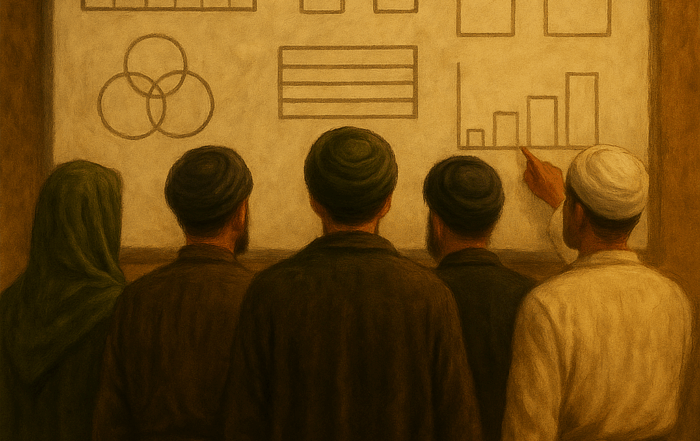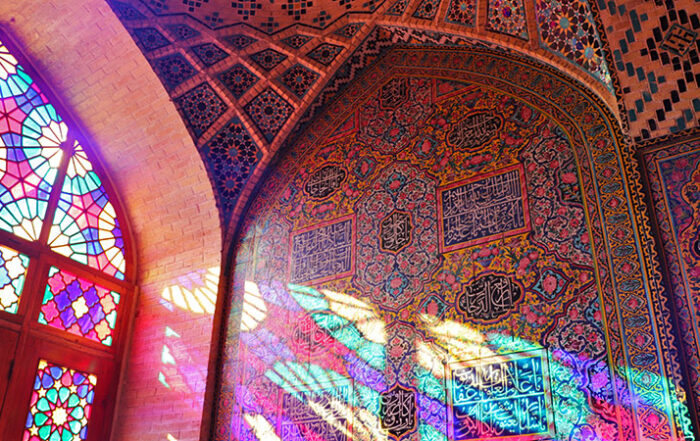1985
Chichawatni
بِسْمِ اللَّہِ الرَّحْمٰنِ الرَّحِیْمِ
اَلْحَمْدُ لِلّٰہِ رَبِّ الْعَالَمِیْنَ وَصَلَّی اللَّہُ عَلٰی مُحَمَّدٍ وَّآلِہِ الطَّاھِرِیْنَ وَ بَعْدُ فَقَدْ قَالَ اللَّہُ اَعُوْذُ بِاللَّہِ مِنَ الشَّیْطَانِ الرَّجِیْمِ تِلْکَ الدَّارُ الْآخِرَۃُ نَجْعَلُھَا لِلَّذِیْنَ لَا یُرِیْدُوْنَ عُلُوًّا فِی الْاَرْضِ وَلَافَسَادًا (قصص۔۸۳)
In the Name of Allah, the Most Gracious, the Most Merciful
All praise belongs to Allah, Lord of the worlds. And may Allah’s blessings be upon Muhammad and his pure progeny.
Thereafter, Allah the Almighty says:
“That is the home of the Hereafter—We grant it to those who do not desire exaltation upon the earth, nor corruption.”
(Surah al-Qasas, 28:83)
Acknowledging Your Efforts
I am fully aware of your busy schedules and how long you have been engaged. Undoubtedly, you must be tired. Moreover, after extended speaking, one naturally feels hunger, and I understand that some of you must leave soon to catch your transport. Considering all of this, I will try to keep my remarks brief and conclude with two or three key points, so as not to further burden you.
Power Changes Behavior—But It Shouldn’t
The first point I wish to address is the concept of leadership and responsibility, specifically from an Islamic perspective.
The difference between Islam and materialist ideologies lies in how they view positions of authority. In materialist schools of thought, positions of leadership are treated as ultimate goals. Whoever attains them considers himself the owner of that position. In Islam, however, these roles are not goals—they are means, tools, and responsibilities.
Whoever is entrusted with a position must regard it as a sacred responsibility and an amanah (trust)—not as a personal privilege. If a person assumes a position and sees himself as its owner, his attitude and behavior will be entirely different from someone who sees himself as a trustee and servant.
To my dear brother—whom I’ve known for several months and whom you call Baqir Bhai—I would say this: now that you have accepted this responsibility, I hope it will not change your character. One change is expected: your responsibility has increased, and so should your dedication, time, and effort toward serving this noble organization.
But there should be no change in your humility and character.
Unfortunately, we see that when some people with a materialistic mindset attain a title, they begin to think highly of themselves. Even those who once sat with them as equals are now met with arrogance or are ignored entirely. Such a transformation is dangerous. It is a sign of corruption, and a warning sign for one’s spiritual health.
The Islamic Model of Leadership
A person who truly embraces Islamic ideology and considers himself a mujahid, a believer, and a servant of the cause—such a person doesn’t delight in attaining a title. Rather, he avoids it. If offered leadership, he hesitates because he understands the weight of responsibility, the burden of accountability before God.
But one who is driven by non-Islamic motivations will strive for power at any cost—even if it means lying, spending millions, or facing humiliation—because he sees power as the ultimate goal.
There’s a well-known story you may have heard: When Ibn Tawus—a renowned Shi’a scholar who, according to our scholars, had multiple audiences with Imam Mahdi (may Allah hasten his reappearance)—was summoned by the ruler of his time to accept the position of Chief Judge, he refused repeatedly.
When the government insisted, they finally asked, “Why won’t you accept this honor?”
He replied:
“Since the day I reached maturity and became accountable before God, I have struggled with a battle within myself—between reason and desire. To this day, I have not been able to resolve this internal conflict. If I cannot fairly resolve matters within myself, how can I judge between others?”
When Is Leadership Obligatory?
If someone is truly God-fearing and ideologically grounded, he will avoid positions unless they become a personal obligation (wajib ‘ayni). That happens when no one else is available to fulfill the responsibility. In such a case, he must accept the position—but only to serve with utmost sincerity and integrity.
So I say to Baqir Bhai and all those accepting leadership roles:
This is a trust. Fulfill it with excellence.
Do your best so that, on the Day of Judgment, your colleagues and community will not hold you responsible for any shortcomings.
May Allah grant all those who have accepted responsibilities in this noble organization the strength and success to fulfill them with sincerity and excellence.
Words of Appreciation
The second point I wish to make is one of commendation. This is a dynamic, nationwide organization. I often say in private gatherings and public forums:
If there is any group in Pakistan today whose youth can be called true Muslims, it is these very young people working under the banners of ISO and IO—those who work for religion, for the nation, for the Qur’an, and for the family of the Prophet (peace be upon them).
Signs of Identity: Where You Stand Reveals Who You Are
Every organization and every individual can be identified through their literature, slogans, and the banners they raise. If one wishes to understand the ideology of the IO, they need only look at their publications and the slogans they use. It becomes clear that their ideology is religious, Islamic, Qur’anic, and rooted in the teachings of Ahl al-Bayt (a).
Just as a bird that soars high in the sky tells you of its lofty nature, and a lowly animal that lives in filth tells you of its baseness—a person’s environment and associations reveal their inner orientation.
When you look at the youth of IO, you find them in mosques, Imam Bargahs, religious seminaries, and gatherings of faith. They are present wherever the fragrance of Islam is in the air. We have never seen them in cinemas, clubs, or corrupt environments.
Their presence in sacred places is proof that these youth are committed to a pure, Islamic worldview. And this is what we expect from you.
If we ever were to find you elsewhere, chanting a different slogan or engaging in un-Islamic behavior, it would be a source of deep disappointment. But alhamdulillah, we have never seen such things from you—and this gives us great hope for the future.
“The Fountainhead of Ideology and Thought… The Qur’an and the Sunnah”
Whoever takes his religion from the Book of Allah and the Sunnah of His Prophet, the mountains may move, but he will not be shaken. And whoever takes his religion from the mouths of men, the men will turn him away.
(Bihār al-Anwār, vol. 23, p. 153)
This is the school of thought, the ideology, the creed that has been derived from the Qur’an and the Sunnah of the Prophet (PBUH) and the purified Household (A.S.). Such a school of thought is a source of pride for us. It alone guarantees our salvation and ultimate success.
If we truly wish to become people of such a school of thought, believers of this caliber, then we must make it a point to attend gatherings where scholars acquaint us with Islam, with the Qur’an, and with the teachings of the Ahlul Bayt (A.S.). Only in mosques, Imambargahs, religious schools, and such spiritual gatherings can we find that knowledge and guidance.
Thus, before we act on any matter, we must reflect and ask:
What does the Qur’an say about it?
What do the Ahlul Bayt (A.S.) teach regarding it?
What would please our living Imam, the Imam of our time (A.S.)?
If we reach a stage where this becomes our approach and concern, only then can we rightly call ourselves ideological, faithful, Shi’a, and true Muslims.
Reducing Rigidity and Focusing on Attraction
We expect from you — and I say this sincerely — that your organization should not become so rigid that sincere, active individuals who wish to work with you are rejected outright. You must adopt a policy that is inclusive and inviting — one that draws pure-hearted, committed, and capable individuals toward your mission.
Islam teaches us to first bring people closer. If someone is severely misguided and beyond reform, only then can you consider distancing yourself. But if someone holds potential, benefit, and sincerity — then bring them closer. Let them grow with you. Let them contribute.
Our Three Identities: Shi’a, Muslim, Pakistani
At any given moment, we carry three identities:
- We are Shi’a.
- We are Muslims.
- We are Pakistanis.
If we were truly Muslims, then consider this hadith:
“Whoever wakes up in the morning and does not care about the affairs of other Muslims is not one of them.”
We Are Also Pakistanis – Responsibilities Come With Identity
As Shi’a, we are always ready to make any sacrifice for our legitimate demands — whether for the preservation of Azadari (mourning ceremonies of Imam Hussain [a.s.]), implementation of Ja‘fari jurisprudence, or other religious rights. But as Pakistanis, we also have responsibilities and rights.
We want America and the global tyrants to know: We are the nation raised in the school of Karbala. We are the children of mothers who mixed the love of martyrdom with their milk. We are the people who bow before Allah five times a day with the dust of Karbala under our foreheads — instilling the passion for martyrdom in our hearts.
A nation whose aspiration is martyrdom is not afraid of death. If America or its agents dare to attack, then not only our men — even our women and children — will rise to defend our religion, our Quran, and our school of thought.
Conclusion: Our Threefold Responsibility
- As Shi’a, we must be ready to give any sacrifice for our religious rights.
- As Muslims, we must be prepared to struggle on an international level against global disbelief and injustice.
- As Pakistanis, we must also claim our political, social, and civil rights.
We must always remember that religious issues cannot be separated from political issues, and political issues cannot be detached from religious principles.
A Final Word of Gratitude
I sincerely thank you, my dear brothers, for giving me the opportunity to be in this blessed gathering and to witness your radiant and spiritual faces up close.
Wassalamu Alaikum wa Rahmatullahi wa Barakatuh


